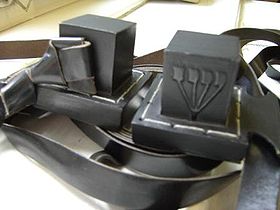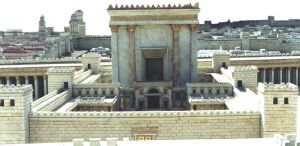THE MODERN EDUCATIONAL MANUAL
Before commencing upon the tale of the Deliverance from Egypt, the Haggadah declares : “Scripture speaks of four varieties of children : the wise child, the wicked child the simple child and the child that is unable to ask questions.”
The Seder affords us a first-class example of the methods by which we should educate our children. It is in fact an ultra-modern pedagogical text-book. The purpose of the Seder is to teach the younger generation the story of the Exodus from Egypt.
Formerly most school subjects were taught only according to text- hooks—history was either just verbally presented by the teacher, or the pupils read history-books, and that was that. In modern schools, however, visual and other aids are used, and pupils often re-enact historical episodes.
Concrete Method
The most modern and perhaps the best. although not always an easy, method of education. is to make the subject matter as concrete as possible. In Montessori and kindred schools, the children are taught everything through their five senses—-beginning with the differentiation of colours, tastes. touch, smell and so on: and through these concrete means they are led to an understanding of the abstract.
In learning the history of the Exodus from Egypt, the Jewish family re-enacts the scene. Not only do we hear from the mouth of others and rend the story ourselves. but we eat the same bread of affliction, we taste the bitterness of bondage in the bitter herbs; we are made to feel concretely the transformation from slavery to freedom, reclining like free men. This is especially important for the child. who grasps abstract and historical matters far better by concrete means.
But this is only one of many points in which the Seder appears to us as a most up-to-date pedagogical manual. Another matter upon which stress is laid throughout this grand night is the asking of questions by children.
Questions
Most children are naturally curious and they soon reach an age when they are always asking “Daddy. why this?” and “Mummy, why that?”
I Jnfortunately. this healthy curiosity is often a bother to teachers and parents, who just have not the time or patience to answer the inquisitive youngsters. But if children do not ask wherefore’s and why’s they will never become wise.
Modern educationalists all agree that on the whole, a child’s questions should never be ignored. On the contrary, children should be encouraged to ask questions. Teaching by lecture is replaced by teaching by discussion, the more modern method, because it arouses active thought. The four questions at the beginning of the Seder and the elements introduced for the purpose of arousing the child’s curiosity, illustrate this.
Many Types
A further principle of education may be gleaned from the statement concerning the four sons. We must accept the fact that there are all sorts of fish swimming in the sea, and in the same way, there are many kinds of human beings. There are all types in the younger generation, and there should, therefore, also be different approaches to these different types. Solomon in his wisdom said : “Educate the boy according to his way.” Since the attitude of the wise son differs from that of the wicked, the approach towards them should also differ.
As any teacher will tell you, the main trouble about present-day education in large classes is that one has to deal with so many types: at the same time. From a truly educational point of view, these types require different methods. A more individual education is therefore much to be preferred. The latter is possible in the home and the wise parent is well advised not to adopt the same approach to different types of children.
‘The wise son—what does he say ? “What mean the testimonies, the statutes and the judgments, which the L-rd has commanded you?” ‘ This is the real pupil who wishes to know everything. ‘Then shalt thou explain to him all the laws of Pesach, down to the minutest detail, such as the custom to eat nothing after the Paschal meal.’
‘The wicked son—what does he say ? “What do you mean by this service? He says “you,” not “we,” and as he excludes himself from the general body, he offends against a principle of faith. You should turn on him and say, “It is because of that which the L-rd did for me when I came forth out of Egypt.” For me, not for him, for if he had been there, he would not have been worthy to be redeemed.’
More than lies in the words of the wicked son lies in the tone of his voice. He comes with a prejudiced attitude—what is the use of religious services—and feels that it has nothing to do with him. The best thing to do with children who have such an approach to study is to make them feel that they will themselves be isolated and suffer for it if they adopt that sort of attitude.
‘The simple son—what does he say ? “What is this?” “And you shall say unto him. By strength of hand the L-rd brought us out of Egypt.” The simple person requires an equally simple answer, bare of details.
‘And to him who does not know how to ask questions—You should open the narrative to him, as it is said, “And you shall tell thy son in that day saying, it is because of that which the L-rd did for me when I came forth out of Egypt.” ‘ The child that does not yet ask questions, should be told the matter simply, but in such a way as to encourage questioning.
Child and Man
To some extent we are all children. The child is the father of the man, and the man retains the tendencies of childhood throughout his life. In the Jewish community, one also meets with all types—and maybe to some extent we all have a mixture of the characteristics of these four sons. We must learn to form an approach to them all, helping the wise to solve their problems; pointing out to the wicked that their anti-human or anti- Jewish attitude will only bring them isolation and that they will fall into the pit they have dug for themselves; explaining matters in a simple manner to those who are simple, and arousing the spirit of enquiry where it yet slumbers.
As far as Jewish religious questions go, the same attitude should be adopted. Notice that the one who does not know how to ask is given the same reply as the wicked one for he who could really learn how to ask questions, but never bothers to learn, will also never be able to enter the religious community. The attitude towards him should be quite different, but the fact remains the same, that he who does not bother even to ask questions concerning Judaism will in the end also be isolated from the religious community of Israel.
Let us thus make the Seder of Pesach the educational text-book upon which to found the generation of the future.





